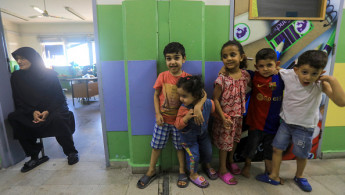Lebanon postpones start of school year amid heavy Israeli bombing
Lebanon’s minister of education announced on Sunday that the start of the school year has been pushed back until 4 November as Israeli strikes continue to pound the country.
The minister, Dr Abbas Al-Halabi, said the decision was made as Israeli aggression and bombardment across various parts of Lebanon has displaced over one million people from their homes, and many are sheltering in schools.
Schools will be making preparations to teach students remotely and through a hybrid system in the coming weeks.
In a press conference, Al-Halabi added that there are many security risks and psychological challenges affecting families and making them unable to take their children to school.
He also noted that private schools will be teaching using distance learning methods depending on their capabilities.
"Given that a number of private schools have informed parents that studies will resume tomorrow [Monday], we call on administrations to realise the dangers of war and ask them to get the approval of parents’ committees" he said.
In his speech, he urged the schools opening to sign a pledge prepared by the ministry which outlines that the decision to teach in-person is the full responsibility of the person who made the call to go forward with it.
The decision to start teaching at universities will be up to each institution’s administration, with those unable to start soon ordered to make necessary arrangements to start teaching as soon as it is safe to do so.
Since the start of the increased Israeli aggression on Lebanon in late September, public schools have been turned into shelters for displaced families.
Al-Halabi said the decision to postpone the school year comes amidst "complex security, political, economic and health conditions and their direct repercussions on the entire educational sector", adding that he consulted extensively with national security authorities, international donors and organisations.
According to the ministry of education, initial data shows that around 400,000 students and 40,000 teachers have been forced to flee their homes in the south, including Nabatieh, the Bekaa, Baalbek-Hermel and the southern suburbs of Beirut.
A plan put forward by the ministry includes co-operating with the ministry of economic affairs to ensure that the internet can withstand the pressure of remote learning across the country, and that it should be free for students and teachers.
Around 1,900 people have been killed by Israel in Lebanon since October 2023, with the majority in recent weeks.
Israel’s bombardment of the country has displaced around 1.2 million people, as people scramble to flee areas targeted by air strikes.
Leading humanitarian and human rights organisations have called for an immediate ceasefire in Lebanon as Israel continues to wage its expanding war in the region.
Earlier this week, representatives from charities, including Save the Children, Doctors without Borders and Oxfam, some of whom have hubs in Beirut, spoke of the devastating impact Israel's war is having on Gaza and Lebanon and the growing risk of further regional escalation.
The speakers also discussed the mass displacement of civilians in Lebanon, the impact on Syrian refugees and Lebanon's fragile healthcare system.




 Follow the Middle East's top stories in English at The New Arab on Google News
Follow the Middle East's top stories in English at The New Arab on Google News


![A group of Palestinians, foreign and Israeli activists gather to participated in an olive picking event on the land in the town of Battir, which is under threat of confiscation by Israel in Bethlehem, occupied West Bank on 8 November 2024. [Getty]](/sites/default/files/styles/image_330x185/public/2182930803.jpeg?h=199d8c1f&itok=__0LgGsa)